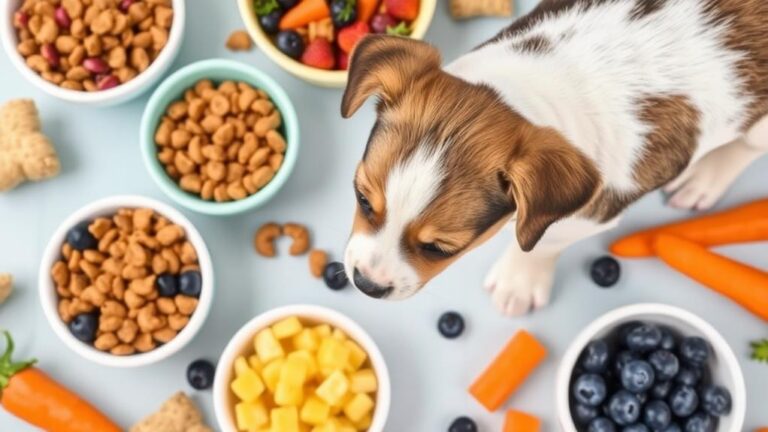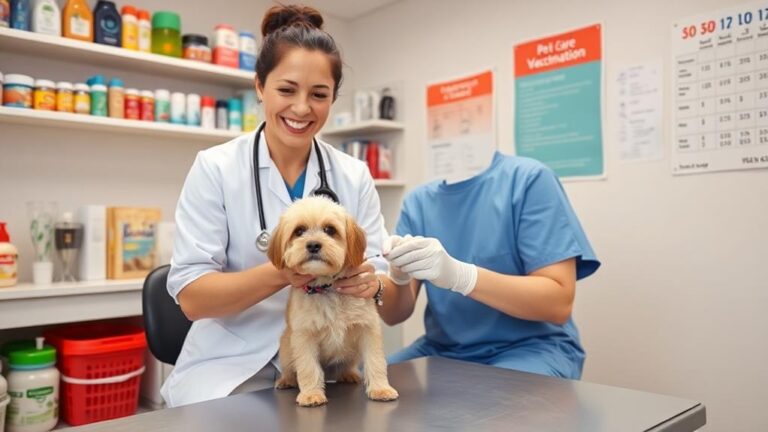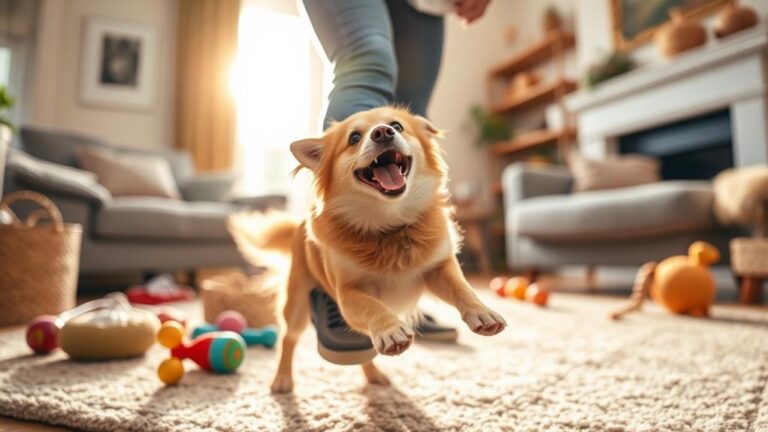At 8 weeks, you can start your puppy on soft foods like canned food or soaked dry kibble. These options are easy for them to chew and digest. You can also give cooked eggs as a healthy protein snack. Small pieces of fruits like bananas, carrots, and apples can be included too. Make sure to feed them three to four times a day, adjusting the portion sizes based on their weight. Always provide fresh water throughout the day. This foundation will help your puppy grow strong and healthy. You'll find even more important tips as you explore further.
Feeding Options for 8-Week-Old Puppies
When you have an 8-week-old puppy, you've got some great feeding options to contemplate. At this age, your puppy can eat soft foods like canned or dehydrated options. These are perfect right after weaning from their mother's milk.
You can also consider cooked eggs as a tasty, protein-rich snack. It's important to guarantee your puppy receives the right amount of food based on their weight to promote healthy growth, as outlined in puppy feeding guidelines.
Introducing healthy human foods like bananas, carrots, and apples can help create balanced eating habits. It's best to feed your puppy three to four times a day. Adjust portion sizes based on how often you feed them. Doing this will support their growth and health.
Solid Food Introduction
At 8 weeks, puppies are ready to start eating solid food. This marks an important step in their growth.
Begin by introducing dry kibble, but soften it with warm water first. This makes it easier for them to chew and digest. You should feed your puppy three to four times a day, as this is essential for their feeding frequency to support healthy development.
Adjust the portion sizes based on how often you feed them to guarantee they're getting the right nutrition. Establishing a regular feeding schedule helps with their digestion and builds a routine.
Keep an eye on how your puppy reacts to new foods. If they seem uncomfortable or refuse to eat, you may need to adjust their diet to guarantee they're getting balanced nutrition.
Potty Training and Bathroom Needs
Puppies' bathroom needs are a crucial part of their early training. At 8 weeks, you'll need to take your puppy out every 2 hours. This helps them learn where it's okay to go.
Remember, puppies under 4 months often need nighttime breaks, too. After meals, watch for signs they need to go. Puppies usually defecate within 30 minutes after eating.
By 14 weeks, you can extend bathroom trips to every 4 hours as their control improves. Start house training when your puppy is between 12 to 16 weeks old. This is when they can hold their bladder better.
Consistency is key, so keep a routine to help your puppy succeed in their potty training.
Outdoor Exposure and Socialization
Introducing your puppy to the outdoors is an exciting step in their development. At 8 weeks, they can start exploring, but be careful. Limit their time in areas where other dogs have been until they finish their vaccinations around 14-16 weeks.
Short outdoor play sessions are best. This helps your puppy get used to the sights and sounds without feeling overwhelmed. Regular outdoor time is key for socialization, too. It helps your puppy build confidence and learn to interact with different environments.
Plus, going outside often reinforces their bathroom habits, making house training easier. Establishing a routine with outdoor walks also helps your puppy adapt better and reduces anxiety as they grow.
Enjoy this adventure together!
Hydration Guidelines
Ensuring your puppy stays hydrated is essential for their growth and health. At 8 weeks old, your puppy should have access to fresh water throughout the day. This helps them stay hydrated and supports their development.
However, you should limit water availability at night. This practice encourages bladder training and reduces nighttime bathroom breaks.
Puppies usually urinate every 3 hours at this age. Regular access to water helps establish a potty routine. If you restrict their water intake, it can lead to obsessive behaviors. That's why consistent hydration is crucial.
It aids in overall health, digestion, and helps with successful potty training. Keep an eye on their water bowl and make sure it's always filled during the day.
Conclusion
At 8 weeks old, your puppy's diet starts to shift. You can introduce high-quality puppy food to support their growth. Remember to keep them hydrated and watch for bathroom needs during potty training. Getting outside for fresh air and socializing with other pets and people is also important. By focusing on these areas, you'll help your puppy thrive and grow into a healthy, happy dog. Enjoy this exciting time with your furry friend!



